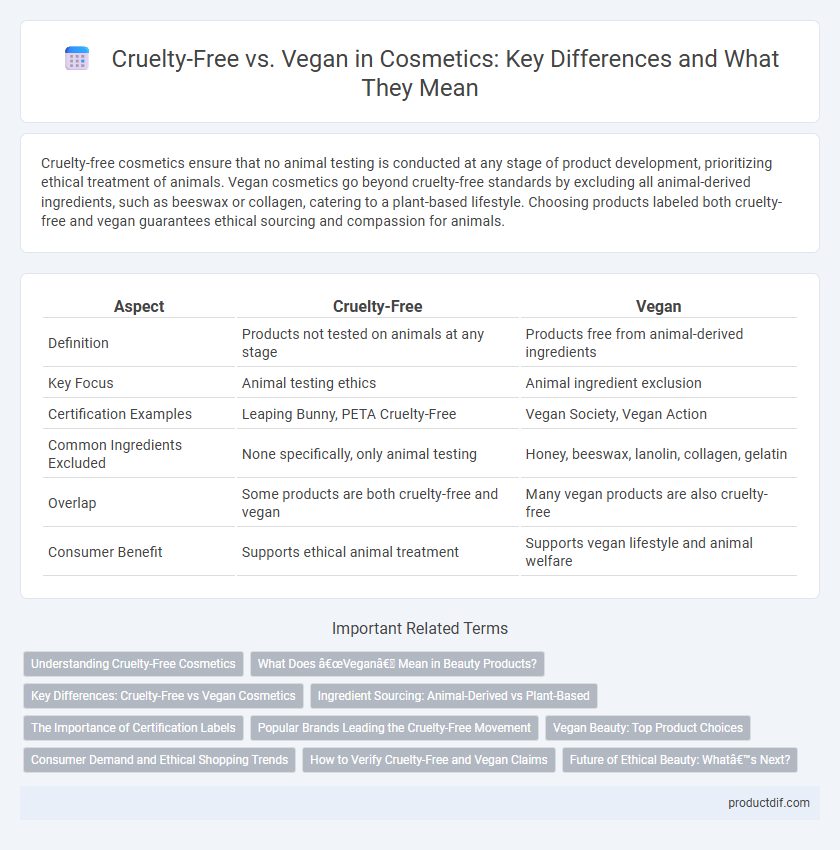Cruelty-free cosmetics ensure that no animal testing is conducted at any stage of product development, prioritizing ethical treatment of animals. Vegan cosmetics go beyond cruelty-free standards by excluding all animal-derived ingredients, such as beeswax or collagen, catering to a plant-based lifestyle. Choosing products labeled both cruelty-free and vegan guarantees ethical sourcing and compassion for animals.
Table of Comparison
| Aspect | Cruelty-Free | Vegan |
|---|---|---|
| Definition | Products not tested on animals at any stage | Products free from animal-derived ingredients |
| Key Focus | Animal testing ethics | Animal ingredient exclusion |
| Certification Examples | Leaping Bunny, PETA Cruelty-Free | Vegan Society, Vegan Action |
| Common Ingredients Excluded | None specifically, only animal testing | Honey, beeswax, lanolin, collagen, gelatin |
| Overlap | Some products are both cruelty-free and vegan | Many vegan products are also cruelty-free |
| Consumer Benefit | Supports ethical animal treatment | Supports vegan lifestyle and animal welfare |
Understanding Cruelty-Free Cosmetics
Cruelty-free cosmetics are products tested without harming animals, ensuring ethical standards in development and manufacturing. These products often carry certifications such as Leaping Bunny or PETA's cruelty-free logo, helping consumers identify genuinely ethical brands. Understanding the difference between cruelty-free and vegan is crucial, as cruelty-free focuses on animal testing, while vegan cosmetics exclude animal-derived ingredients.
What Does “Vegan” Mean in Beauty Products?
Vegan beauty products exclude all animal-derived ingredients such as beeswax, lanolin, and collagen, relying instead on plant-based or synthetic alternatives. This ensures formulations free from animal exploitation, aligning with ethical standards for consumers seeking cruelty-free and environmentally conscious options. While cruelty-free guarantees no animal testing, vegan specifically refers to the absence of animal ingredient use in the product's composition.
Key Differences: Cruelty-Free vs Vegan Cosmetics
Cruelty-free cosmetics are products tested without harming animals at any stage of development, ensuring ethical treatment during safety assessments. Vegan cosmetics exclude all animal-derived ingredients such as beeswax, lanolin, or collagen, focusing solely on plant-based or synthetic substitutes. The key difference lies in cruelty-free addressing animal testing practices, while vegan emphasizes ingredient sourcing and formulation.
Ingredient Sourcing: Animal-Derived vs Plant-Based
Cruelty-free cosmetics ensure no animal testing in product development but may contain animal-derived ingredients such as beeswax or lanolin. Vegan cosmetics strictly avoid all animal-derived components, relying entirely on plant-based or synthetic alternatives like shea butter and jojoba oil. Ingredient sourcing in vegan products emphasizes sustainability and ethical harvesting of botanical extracts to maintain eco-friendly standards.
The Importance of Certification Labels
Certification labels such as Leaping Bunny and Vegan Society play a crucial role in verifying cruelty-free and vegan cosmetic products, ensuring ethical standards are met. These labels provide consumers with transparent information, helping them make informed choices that align with their values regarding animal welfare and ingredient sourcing. Accurate certification reduces the risk of greenwashing and supports brands committed to sustainable and ethical production practices.
Popular Brands Leading the Cruelty-Free Movement
Popular brands leading the cruelty-free movement include Lush, The Body Shop, and Pacifica, all of which prioritize ethical testing practices by eliminating animal testing. These companies often combine cruelty-free certifications with vegan product lines, appealing to consumers seeking compassionate and sustainable cosmetics. Their commitment to transparency and innovation drives industry-wide shifts toward more humane beauty standards.
Vegan Beauty: Top Product Choices
Vegan beauty products exclude all animal-derived ingredients such as beeswax, lanolin, and carmine, appealing to ethically conscious consumers seeking plant-based formulations. Top choices include brands like Pacifica, e.l.f. Cosmetics, and Urban Decay, known for high-quality vegan makeup and skincare that deliver effective results without animal exploitation. These products often feature natural antioxidants, botanical extracts, and cruelty-free testing methods, ensuring both ethical values and performance.
Consumer Demand and Ethical Shopping Trends
Consumer demand for cruelty-free cosmetics has surged, driven by increased awareness of animal welfare and ethical production practices. Vegan cosmetics, which exclude all animal-derived ingredients, align with growing ethical shopping trends prioritizing sustainability and environmental impact. Market data reveals a significant rise in sales for brands certified cruelty-free and vegan, reflecting a shift toward conscientious consumer behavior in the beauty industry.
How to Verify Cruelty-Free and Vegan Claims
To verify cruelty-free claims, check for certifications from recognized organizations like Leaping Bunny, PETA, or Cruelty Free International, which ensure no animal testing at any production stage. Confirm vegan status by looking for certifications such as The Vegan Society or Vegan Action, which guarantee the absence of animal-derived ingredients. Reviewing ingredient lists and company transparency reports can further validate both cruelty-free and vegan claims.
Future of Ethical Beauty: What’s Next?
The future of ethical beauty is increasingly shaped by the convergence of cruelty-free and vegan standards, emphasizing transparency and sustainability in cosmetic formulations. Innovations in plant-based ingredients and biotechnology enhance product efficacy while minimizing environmental impact. Consumers demand brands that not only eliminate animal testing but also commit to fully vegan, eco-friendly practices, driving industry-wide adoption of ethical certifications.
Cruelty-free vs Vegan Infographic

 productdif.com
productdif.com